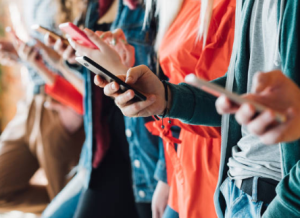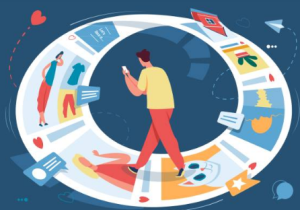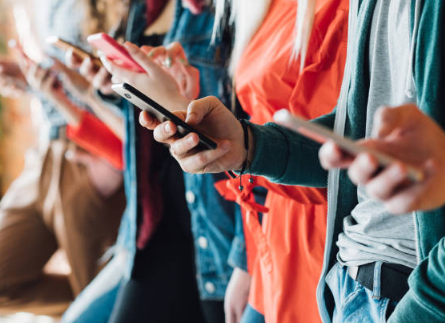People around the world use their phones to perform a variety of tasks, such as communication, gaming, and self-care. Excessive use of mobile phones can create problems, leading to problems with concentration and mood. However, there are ways to kick cell phone addiction, such as recording the time you spend on screens and turning off notifications. Here’s what you need to know.
Why Are Mobile Phones Addictive?
Phones can be easily addictive due to the app’s functionality, the pleasure of using the phone, and the app’s emphasis on grabbing the user’s attention.

The App Is Designed to Promote Addictive Behaviors
Almost every app on your phone is designed to generate a response about the chemical manipulation of the brain that triggers addictive behavior. These apps may have the following features:
- Endless scrolling or streaming: Constant access to what you’re watching
- Reach out to what app users love: See what’s most interesting to you on your feed
- Pure exposure effect: Use an app to the point where it’s hard to let go
- Social Comparison or Reward: Engage and expect positive social feedback
- Social pressure: Engage in quick interaction with other users of the app
- Zeĭgarnik Effect/Ovsiankina Effect: It is easier to remember interrupted tasks than to remember completed ones
Using a Mobile Phone Pays Off
Psychologists use a term to describe the unpredictable, unpredictable feeling and sudden anticipation whenever you pick up your phone: intermittent rewards.
Slots take advantage of the feeling that something exciting can happen at any time to encourage addictive behavior. Smartphones are basically slot machines that we keep in our pockets.
Social Media “Sells” Attention
Social media can be fun, but Price notes that it’s important to remember that these apps aren’t just about sharing selfies.
Have you ever wondered why social media apps are all free? because we are not actually customers, and social media platforms are not products themselves. Instead, the customer is the advertiser. And the products we sell are our attention. It’s really a big deal because our attention is the most valuable thing we have. As we decide what to focus on in the moment, we are making broader decisions about how we want to spend our lives.
Symptoms of Cell Phone Addiction
Different signs that a person may be addicted to their cell phone may include:
- Use your phone to beat boredom
- Spend most of the time using your phone
- Feeling anxious, depressed, or irritable when they don’t have a cell phone
- It is not possible to restrict the use of the phone
- Problems arise when used in hazardous situations
- Loss of relationship
- Repeated home, mental, physical, social, or work disruptions
In the latest version of the Diagnostic and Statistical Manual of Mental Disorders (DSM-5-TR) (Guidelines for Mental Health Professionals in the Diagnosis of Disorders), cell phone addiction itself is not considered an official diagnosis. However, some of the characteristics of cell phone addiction may resemble other behavioral addictions listed in the DSM-5-TR.
Side Effect
Smartphone overuse can affect physical and mental health, social interaction and participation, and cognitive processing.
Cognitive Effects
Using a smartphone can lead to more distractions, cognitive distractions, and distractions. Distraction itself can lead to an increase in smartphone usage habits.
The chaotic landscape of links and ads and the brief bursts of attention required to scroll, swipe and tweet lead to a paradox: “a state of highly focused distraction.”
While this disturbance may seem temporary, its effects may be long-term. This frequent, focused distraction is not only capable of bringing lasting changes to our brains, but is particularly good at doing so.
Also, when someone casually checks a text message during a conversation, it’s known as a bowing family – just like a phone snub. When the attention shifts from the real person to the virtual person or account, the Bow Clan quickly happens. One study found that people with low heads were associated with the following factors:
- The feeling of being excluded
- Negativity
- Basic needs are threatened
The same study also found that speaking with your head bowed three times in a row was less effective than doing it just once.

Physiological Effects
A review found several health problems associated with excessive cell phone use among teens and young adults, including:
- Decreased sleep duration and quality
- Eye problems
- Headaches and migraines
- Neck pain
- Problems falling asleep
Psychological Effects
Cell phone addiction can also affect your behavior, mood, or thoughts. Studies have shown that this type of phone use is associated with the following conditions:
- Alcohol use disorder
- Anxiety, including generalized anxiety and social anxiety
- Attention-deficit/hyperactivity disorder (ADHD)
- Depression or low mood
- Impulse
- Poor mental and mental health
- Inferiority
- Obsessive-compulsive disorder (OCD)
- Post-traumatic stress disorder (PTSD)
- Shy
How to Quit Mobile Phone Addiction
You can start by determining a baseline of how attached you are to your phone.
Try the smartphone compulsion test, developed by Dr. David Greenfield of the Center for Internet and Technology Addiction at the University of Connecticut School of Medicine. Greenfield said that answering “yes” to more than 5 of the 15 questions indicates that the person may have an issue with their relationship with their mobile device.
You may also want to consider the following, which may include:
- Go to your settings and turn off notifications on your phone
- Download tracking apps, such as IOS Screen Time for iPhone and Digital Wellbeing for Android, to show your screen time
- Take your phone out of the bedroom to help you fall asleep
Researchers have also found that engaging in moderate-intensity exercise and seeking help from a mental health professional to change behavior is beneficial.
Conclusion
Signs that you may be addicted to your phone may include using your phone because you’re bored, feeling anxious when you don’t have one, or not being able to reduce your phone usage.
Mobile phone addiction can have cognitive, physical, and psychological side effects. However, you can control your phone addiction by controlling notifications and monitoring screen time, among other things.

